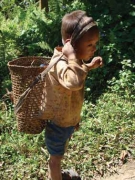Bharat Sharma
Water poverty in the northeastern hill region of India: Potential alleviation through multiple-use water systems - A report by IWMI
Posted on 20 Dec, 2010 12:07 AM This study by IWMI maps the household water poverty in a typical remote village of the northeast, understands the causes for such a scenario and reflects on the past efforts. Local water resource-based multiple-use water systems that provide water supply both for household and livestock needs and for small high-value agriculture are understood.
This study by IWMI maps the household water poverty in a typical remote village of the northeast, understands the causes for such a scenario and reflects on the past efforts. Local water resource-based multiple-use water systems that provide water supply both for household and livestock needs and for small high-value agriculture are understood.
The per capita and per hectare availability of water in India is highest in this region but the societal (both productive and consumptive) water use is less than five per cent of the existing potential. The unutilised and excessive water supplies during the rainy season create a mayhem of devastations almost every year with ravaging floods, landslides, soil erosion and other infrastructural failures and miseries and unrest in large parts.
Energy supply and the expansion of groundwater irrigation in the Indus-Ganges Basin - A working paper by Challenge Program on Water and Food
Posted on 22 Aug, 2010 08:27 PMThe paper by International Water Management Institute (IWMI), Challenge Programme for Water and Food (CPWF) and University of Arizona deals with energy supply and expansion of groundwater irrigation in the Indus-Ganges basin. Irrigation using groundwater has expanded rapidly in South Asia since the inception of the Green Revolution in the 1970s and it represents the largest source of irrigation in the basin.
Remote sensing and census based assessment and scope for improvement of rice and wheat water productivity in the Indo-Gangetic basin - A working paper by Challenge Program on Water and Food
Posted on 22 Aug, 2010 04:48 PMThis paper by the Challenge Programme for Water and Food (CPWF) presents a simplified approach to combine remote sensing, census and weather data to analyze basin rice and wheat water productivity (WP) in Indo-Gangetic river basin, South Asia. It presents an innovative approach to combine meteorological data, ground survey, national census with remotely sensed imagery to assess water use, yield, and finally crop water productivity for the Indo-Gangetic rice-wheat cropping system in South Asia.
Water, climate change and adaptation: Focus on the Ganges river basin - A working paper by Challenge Program on Water and Food
Posted on 18 Aug, 2010 11:11 PMThis working paper by the Challenge Program for Water and Food explores the intersection between water management, climate change, and adaptation in the Ganges River system, a basin vital to the security, economy, and environment of South Asia.
Recognizing that an understanding of both the science and the policy of water management, climate change, and adaptation is rapidly evolving, it is not the intention of the paper to encompass all the issues related to these broad fields, but rather to provide a starting framework from which to further develop research questions and priorities for work in water and adaptation.